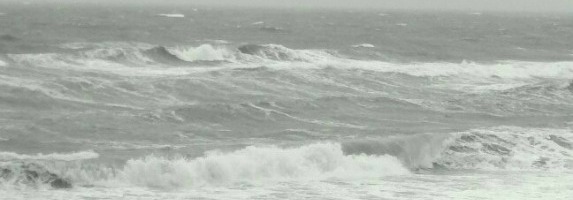I am just finishing up the book Deep Survival by Laurence Gonzales for a second time. The book is all about accidents - what causes them, how to avoid them and how to survive them. One of the most intriguing stories presented in the book is about three experienced climbers who set off to climb Cathedral Peak in Yosemite.
The men drove from San Francisco to Yosemite, camped out for the night, and awoke the next day at 4AM to the first unplanned event. A bear had stolen their food, which forced them to get new food, which delayed the start of their climb by 2 hours.
Tired from the early wake up and hungry from lack of food they rushed to complete the 3 mile hike to the mountain. Once on the peak they pushed for the top, despite the thunderclouds which hung on the horizon. Due to the delay they would be on the face of the peak late into the afternoon, when thunderstorms were most likely.
"The Most Terrifying Sound"
The forecast said sunny skies, but that was yesterday's forecast. No one had thought to check for a more recent update. The climbers had left their water proof clothing at home and were instead wearing cotton. Still they could turn back and head down the mountain, but they decided to push on.
About 3/4 of the way up the 10,940 ft peak the skies opened and it began to hail. A mammoth thundercloud descended on the climbers, bringing with it a strong negative charge which illicit an equally powerful positive charge from the Earth.
Suddenly everything around the climbers began to buzz. One of the climbers later stated that it was "the most terrifying sound" he had ever heard.
Seconds later a devastating lightning strike surged through the peak and into the climbers' bodies. The guys got slammed by the electricity and were seriously injured. One of the climbers had suffered a direct hit and suddenly the men found themselves in a life threatening, brink of existence situation, on the sheer face of a mountain, wearing nothing but cotton t-shirts.
Don't Succumb to "Plan Blindness"
Halfway through Chapter 5 of Deep Survival I began to wonder how the climbers had even gotten themselves into this situation to begin with. I found myself asking simple questions like:
- Why didn't they check for a recent weather forecast before starting their climb?
- What caused them to continue pushing for the top, despite seeing huge thunderclouds looming on the horizon?
- How could they not of packed appropriate clothing, being so experienced?
It seemed to me that the signs of trouble were obvious. Yet there is an important difference to be made between the climbers, and I.
The climbers had made plans. The guys wanted to stick to their plans and achieve their goal of reaching the top of the peak. Plans are great, as long as you can remain aware of when the plan needs to be changed, or abandoned all together.
"Sticking To The Plan" Can Be Dangerous
Unfortunately, this is a skill that not everyone has cultivated. It can be challenging to deviate from the plan, especially if you are with a group of people.
However breaking the plan can save your life, or prevent you from entering a dangerous situation all together. It is a critical skill for safe boating off Cape Cod, where thunderstorms, fog, squalls and an endless list of other unexpected things can happen.
Here are my top 3 recommendations for avoiding Plan Blindness at all costs:
- Be aware of the hidden pressure that "sticking to the plan" can have on your decision making process
- Don't feel bad about ruining other people's plans because its the safe thing to do
- When you schedule a fishing trip, make it clear to everyone that the trip is always weather permitting
With regards to weather in particular, it can really pay to have at least a basic understanding of typical weather patterns on Cape Cod.
Take It Easy And Don't Rush
The climbers were in a rush because the bear had stolen their food, which delayed them 2 hours. They only had one day to complete this climb. It was now or never, and in their minds they had to make it happen.
I can think of a similiar situation that I almost got myself into. I was set to meet a charter at 5AM sharp, which would put us where we needed to be at the right time, on the right tide.
I am never late to a fishing trip, so I was shocked when I awoke at 4:15AM - a full two hours later than usual. Still, if I hustled I could rush through gear preparations, hook up the trailer to the truck, blast over the Sagamore Bridge and dump my boat down the boat ramp before the charter arrived at the dock.
I moved as quickly as I could, cruising through a mental checklist at warp speed so I could be on time. Then suddenly I stopped and the full realization of how foolish I was acting, hit me like a ton of bricks.
If I had continued to rush I would be:
- Putting myself at risk because I was more focused on getting from point A to B as quickly as possible, as opposed to focusing on getting from point A to point B as safely as possible
- Putting the guy in the car on the bridge behind me at risk, because I would be rushing through the trailer to truck connection, and risk forgetting to hook up a safety chain etc.
- Putting my customers at risk because in my haste I might of forgotten a simple safety item like a back up set of flares
Rushing to get to the fishing rounds can be particularly risky.
For example, you won't notice that whale in the near distance or a large piece of drift wood directly off your bow if you are overly focused on getting to the hot spot as quickly as humanly possible.
Pay Attention To Your Gut
On a windy and warm night in July of 2013 I found myself fishing along the edge of marsh close to Nauset Inlet in the town of Eastham. It was 2AM and I was all alone, minus the small deer that had made an appearance on a sandbar behind me.
I decided to do some exploring and was soon standing on the edge of the marsh, where at low tide the muddy edge drops vertically at least 8 feet. In the dim light of the moon I could see where other broad swaths of the marsh had cracked off, and plummeted into the water. There was evidence of erosion all around me.
I did not feel good about the situation I was in. Logically I understood that the odds were slim at best, that the section of marsh on which I stood, would suddenly crack apart from the main body and fall into the swift current. It just wasn't reasonable to think that could happen, on this particular night, to a very safe and cautious guy like me.
Nevertheless the sinking feeling in my gut was overwhelming, so I caved in and quickly exited the area, feeling increased relief the further away I got from the edge. Several minutes later and I was safe on a sandbar. I breathed easy and cast out towards the inlet.
A deafening, booming crack then pierced the early morning air, and my heart jumped up my esophagus and into my throat. I dropped to my knees in the shallow warm water, half convinced that I was being shot at.
I then looked up and watched a mini-tsunami wave shoot across the inlet towards the opposite shoreline. A section of marsh, weighing thousands of pounds had cracked away from the main body of marsh, and crashed into the estuary water.
The exact scenario that my gut had warned me about, actually occurred. The experience has solidified my belief that your emotions/gut will warn you that you are entering a dangerous situation by producing a negative feeling. When boating or fishing it is of utmost importance to pay attention to these subtle signals.
My gut literally saved me from becoming involved in a dangerous situation. If you trust your gut at all times, you will be a safer boater and fishermen.
Staying Safe | The Rundown
Here are a few more ways to increase safety this year on the water, and avoid putting yourself or your crew into a dangerous situation.
- Stay Calm - especially when running and gunning after tuna in less than ideal visibility
- When In Doubt Get Outta There - like when a big SW wind has pushed you dangerously close to the rocks of the Elizabeths
- Check 3 Different Weather Forecasts - then make the call based off the three opinions and current conditions
- Know The Environment - at the least talk to someone who has fished or boated the area before
- Take Swift & Cautious Action - like immediately pushing the M.O.B. button on your GPS when someone falls overboard
- See The Beauty Around You - if you make it a priority to see the beauty around you, you will naturally be " in the moment" and better equipped to respond and notice the unexpected
In Conclusion
Lets make 2014 the best and safest fishing season ever. I plan on keeping safe by not succumbing to plan blindness, taking it easy and paying attention to my gut. I think the same theories can help you too.
After all, the climbers in the story mentioned above...all four were electrical engineers.
What do you think? Let me know by commenting below.




Ryan, outstanding article! Safety can never be reinforced enough. With all the preparation, planning and time, it can sometimes be tough to listen to your gut that’s telling you to “bail”, especially a trip in progress (i.e you reach open water and you find out that all 3 forecasts were wrong).
Thanks Paul, I have a feeling you may be hinting at that East of Chatham tuna trip you attempted last year?
Gotta love that east wind!! lol
You remembered, lol! Actually, it happened on two consecutive trips – ENE one day and S the next. I was very unpopular for bailing twice in two days, but hey…everyone got back safe.
Oh yeah I remember bad weather, even when its not me that is getting stuck in it. LOL
Glad you guys got in safely. That is what matters most. 2014 will be the year of the tuna for Paul Morgan!
Great post. Fishing is a lonely sport sometime. You have to be prepared and cautious. The ocean has no pity.
Absolutely Warren.
Good luck this weekend with the holdovers!
Looking forward to a good fishing season.it all sounded like common sense but common sense does not work when rushing around .
I think 2014 will be a great season, and I’m looking forward to it as well Lorin.
Awesome post and well worth the read
Thanks Paul!
Ryan,
Very good article – I especially liked the Safety rundown checklist – it seems that when a person is in a panic situation, all logical thinking goes out the window, so having a checklist of priorities may get a person back on track. Even though MFCC concentrates on boating/fishing, this article shows that you rank safety as the #1 priority , like the example of a captain being accountable for those people on his charter boat trip. Many boaters/fisherman can tell you about all kinds of problems, not many can tell you about the solutions – this article definitely focuses on awareness. Again, great information ! ! !
Thanks Donald, I’m glad you enjoyed the post and I really appreciate your awesome comment.
Logical thinking can easily go out the window in certain high stress situations.
I feel the book Into Thin Air is another awesome read for any boater who wants to learn first-hand what can happen when people aren’t thinking clearly.
It is much easier to cancel a trip than it is to abandon one in progress, but that is the right thing to do for everyone’s sake when you can’t get comfortable with things that are happening right now. My companions have never jumped on me for turning around when things were not going right. There is enough risk on the water that you can’t foresee, so why push the edge of that which you can see.
I agree Jerry…it’s definitely tough to turn around when you are already out there.
Like you say, why push the edge of that which you can see.
Hi Ryan,
I’m grateful for these reminders. As I advance into middle age one of the benefits is recognizing when I’m hurrying. Nothing good ever results when I hurry. I get to the beach and I have forgotten my tins, or my eel rag, or my knife, or my gaff. ..or I’m a tad late in reaching my spot and I attempt to scamper through the ankle busters and get to my boulder field, slip, go head over keester and sprain my ankle, bury a hook in my thumb…arrgh. Now I am very deliberate about taking caution not to hurry and when I do hurry to STOP, sit and think. I need to be more conscientious about monitoring multiple weather forcasts before and during my evening/pre-dawn forays. Walking for an hour over ankle busters to get to your spot, then have a squall come up and hasten high water can make for a really crappy return trip through the wash while you’re up tight against adjacent cliffs. Thanks for making me think much more intentionally about this deal.
Hey Ned – I am happy you got so much out of this post, and I agree 100% with “nothing good ever results when you hurry”
One example of how hurrying can hurt happened to me on Cuttyhunk Island last year. I was rushing, which resulted in me dropping my GoPro camera in the ocean (instantly fried) and then 3 minutes later I embedded a treble hook into my finger.
I literally had to stop and ask myself what the heck I was doing, and why I was in such a rush – it just made no sense.
Thanks for the great comment, and take it easy out there on those boulder fields!
Yes, trust your gut.you can’t go wrong erring on the side of caution. I won’t bore you with details but I have found myself in more than a few tight spots over the years. Thankfully I’ve learned to heed the warning signs before I got myself in over my head.(pun intended) I would like to add to your recommendations by saying that there is usually more than one indicater that things are getting dicey. It’s likely to be three or more little things that quickly add up to a huge problem. Not paying attention to the early warning signs no matter how small can land you on the front pages. -thanks for the reminder.
Great insight Art. I think you are spot-on with your comment about there usually being 3 or more “little things” that are indicators of things getting dicey.
Definitely a good idea to remain in the moment, so you don’t miss those subtle warnings.
Thanks as always for chiming in.